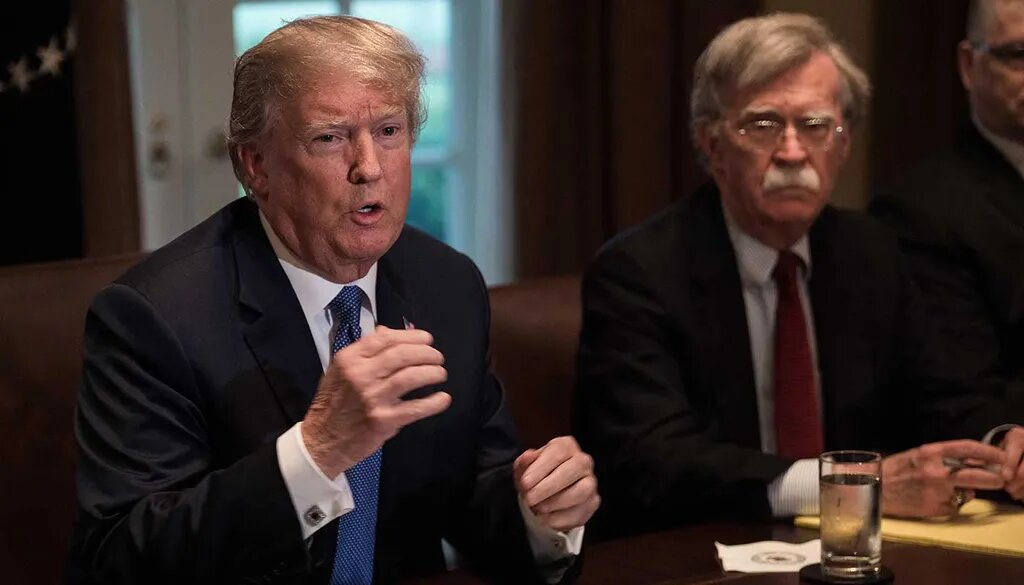US strategy in Venezuela stirs regional alarm, echoes Bolton’s coup revelations

TEHRAN – The recent deployment of United States military forces in the waters off Venezuela has reignited concerns over Washington’s long history of interventions and regime-change policies in Latin America and the Caribbean. The move comes amid US claims that the deployment is intended to combat threats from regional drug cartels.
According to the Associated Press, citing a defense official who requested anonymity, three American amphibious assault ships — carrying over 4,000 sailors and Marines — are scheduled to enter the region this week. The US Navy already operates two Aegis guided-missile destroyers, the USS Gravely and USS Jason Dunham, in the Caribbean, while the destroyer USS Sampson and the cruiser USS Lake Erie are positioned in waters off Latin America.
In response, Venezuelan President Nicolás Maduro has mobilized troops along the nation’s borders and urged citizens to join armed militias to defend the country. Maduro characterized the US military build-up as an effort to overthrow his government and declared that Venezuela is at “maximum preparedness” to respond to any attack. He further warned that he would constitutionally declare a “republic in arms” if US forces engaged Venezuelan territory, while also denouncing US Secretary of State Marco Rubio as a “warlord” pushing for regime change.
The Trump administration has long accused Maduro of ties to drug trafficking and criminal networks, though US intelligence reportedly found no evidence linking him to the Venezuelan criminal group Tren de Aragua, undermining public claims made by Trump and his allies. Earlier this year, the US doubled its reward to $50 million for information leading to Maduro’s arrest over alleged drug trafficking connections.
Rising US military activity in the Caribbean has prompted warnings from regional journalists.
“On the surface, the deployment of US troops in the Caribbean may appear to provide an additional layer of security. However, this presence could also draw unwanted attention to our shores. For decades, the Caribbean has largely been regarded as a zone of peace, and any suggestion of looming conflict is deeply concerning,” Quinn St. Juste, a Saint Lucian journalist from the St. Lucia Times, said.
The Saint Lucian journalist noted that lasting stability in the Caribbean can only be achieved through diplomacy, not force.
“Ultimately, the only path to lasting stability for the region lies in a peaceful, diplomatic resolution—whether through international mediation, arbitration, or a binding agreement—ensuring that the region emerges unscathed both economically and otherwise. We do not want drugs in the region, however we do not want its elimination at the expense of a war,” he said.
This military deployment echoes decades of US interventions in Latin America and the Caribbean, including coups, invasions, and sanctions against governments that resist its influence. Venezuela has been a recurring target: in May 2020, Venezuelan security forces arrested dozens, including two Americans, after a failed beach invasion allegedly aimed at toppling Maduro, reportedly involving US-backed opposition leader Juan Guaidó. Following the controversial 2018 presidential election, which saw Maduro re-elected, the US and other countries refused to recognize the results, labeling Guaidó as interim president and imposing severe sanctions on Venezuela.
John Bolton, former US National Security Advisor, provides further insight in his controversial memoir, The Room Where It Happened, revealing that discussions about regime change in Venezuela were ongoing at the highest levels of the Trump administration. Bolton writes candidly about US efforts to oust Maduro, describing Venezuela as a nation where Washington believed it could impose its political will, highlighting the broader pattern of US hegemonic ambitions in the region.
The latest military deployment in the Caribbean underscores a continuation of this strategy: using the pretext of combating organized crime to justify a show of force, while signaling to Latin American nations that resistance to US influence may come at a high cost. The move raises urgent questions about the future stability of the region and the limits of diplomatic versus military approaches in addressing the ongoing political crisis in Venezuela.
Leave a Comment